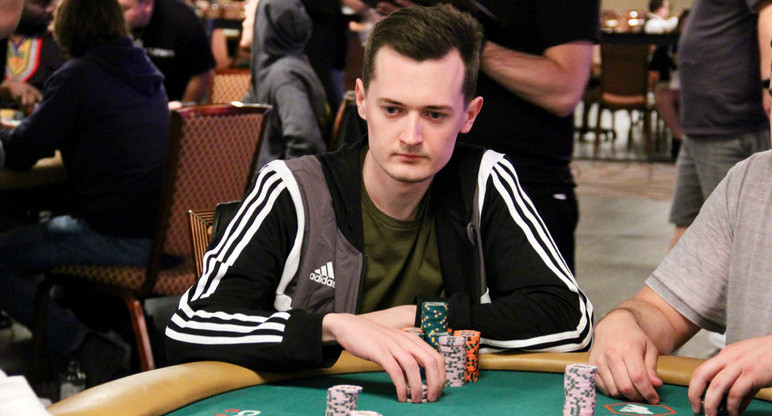






Poker Staking Group Attempting To Steal From WSOP Main Event Final Tablistby Gavin Griffin | Published: Sep 11, 2019 |
|
|
 As is often the case when there’s a lawsuit, nobody in this story comes out looking great.
As is often the case when there’s a lawsuit, nobody in this story comes out looking great.
To recap the latest bit of poker legal drama, Nick Marchington finished seventh in the World Series of Poker main event for $1.525 million. Unfortunately for C Biscuit staking, a group of backers he had sold action to, he refunded their stake a couple of days before the main event began. The 21-year-old gave the excuse that he could sell the piece at a higher mark up, and that since he had been having a losing summer he needed to look out for his own best interests.
Now, the group is suing him, and says he owes them their 10 percent cut, even though he explicitly canceled their action before the event started and they accepted the refund.
Deals in poker are often sealed with a text or a DM. I’ve bought pieces through mediums like Twitter, the 2+2 forums, text message, and email. I’ve also used cash, Paypal, Venmo, poker site funds, and even Neteller back in the way, way long ago. I’ve never had someone cancel a piece for the price I bought it unless they decided not to play the event. If that had ever happened, I’d be sure to never buy action from that person again. It’s a poor way to do business. If you’re not happy with the price you sold at or you realize that you could have gotten better, I think you should chalk that up to experience and try to sell higher at the next opportunity. That being said, though I think it’s poor practice, I wouldn’t say Nick did anything wrong by canceling and refunding C Biscuit.
Matt Salsberg posted a poll that seems to be related to this particular incident just before the whole situation really started to make its way into the public poker consciousness.
Player sells a piece of himself for tourney to buyer A. Buyer A sends money/is booked. But before tourney starts player refunds buyer A and says deal voided (then sells to buyer B at more mark up). Is this all fine/kosher/standard?
— Salty (@msalsberg) July 28, 2019
You can see by the results of this poll that of the more than 2,600 votes on this subject, not many (only 8 percent) think that what Nick did was perfectly fine. At the very least, Marchington sacrificed some of his personal reputation in order to gain some money, something that people do quite often in all walks of life. If, for instance, he hadn’t done well in this tournament and it somehow got out that this happened, people would be more apprehensive to buy his action in the future.
While Nick did make a small mistake here, I think C Biscuit is just trying to steal from him. According to all of the events as we know them and as they are currently agreed upon in court documents, Nick canceled the action with them, they accepted, and the two parties began making arrangements to return the money that was originally sent to Marchington, eventually settling on a cash payment that was delivered before play started on day 2 of the main.
Initially I offered to refund with Pokerstars (how the piece was paid) then PayPal. Finally we settled on cash. My efforts to refund began BEFORE the Main Event; the refund got collected before my day 2 of the Main Event.
— Nick Marchington (@NickMarchington) August 3, 2019
Nick canceled, they agreed to the cancellation, albeit with some reservations about Nick’s behavior, and then they accepted the refund. That should have been the end of the story, and it would have been if Marchington hadn’t made a deep run. C Biscuit saw an opportunity to get money that they weren’t entitled to and jumped at it, filing a lawsuit stating that even though they agreed to the cancellation before play in the tournament started, they didn’t receive their money until after day 2 and therefore their action was still on. It’s the sort of opportunistic, predatory thing you would expect of a Private Equity firm, a loophole so slim you’d need to fully oiled up to slip through.
Let me just reiterate, I think C Biscuit is attempting to steal from Nick Marchington, and I don’t want to sugarcoat that.
I’ve had a backer for a very long time for tournaments. We have no paper contract in place. I trust him and he trusts me. I’ve bought pieces of other players in many situations and I haven’t had a bad experience yet, even though I bought some of MI_Turtle one year.
It comes down to this. Know who you’re doing business with.
The poker world is a place where money flows freely. People win millions one week and are broke the next, perhaps even before they make it out of the casino. Excessive gambling is considered a virtue until said gambler is broke and can’t pay their backers.
Before you enter into an agreement to stake or be staked, do your research. Know not only who you’re working with, but also whether you’re getting the best deal you can so you don’t have buyer’s or seller’s remorse. You can’t have a 100 percent success rate, but at least you can feel comfortable about the job you’ve done to ensure your equity’s safety. It’s tough out there, but the internet gives you lots of opportunities to make sure you’re doing it right.
Features
The Inside Straight
Strategies & Analysis